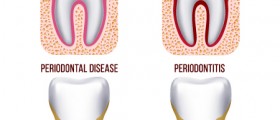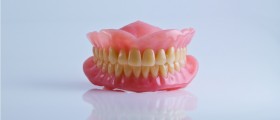
Chronic periodontitis is defined as a disease that affects the periodontium. Periodontium are specialized tissues that surround and support the teeth. Term periodontitis actually describes any of the inflammatory diseases that affect the periodontium. Chronic periodontitis is typically used to describe the stage in which the progressive loss of the alveolar bone around the teeth occurs. Before this stage, patients may suffer from gingivitis, which is a non-destructive periodontal disease. If left untreated, gingivitis may progress to chronic periodontitis. According to the official medical data, chronic periodontitis is always preceded by gingivitis. Chronic periodontitis is typically diagnosed based on the symptoms and by inspecting the soft tissues around the teeth with a probe. Sometimes, doctors may use x-rays to determine the amount of bone loss around the teeth.
Signs and symptoms of chronic periodontitis
Chronic periodontitis is a relatively common disease but most of the patients fail to recognize its first symptoms. In the early stages, the only symptoms of inflammation are redness and bleeding of the gums. This is something that many of the patients find normal. However, healthy gums and tissues do not bleed. Any sign of bleeding upon brushing, flossing or eating, indicates hypersensitivity of the gums, which probably occurs as a result of inflammation.In addition, patients’ gums may be swollen and this swelling of the gums typically comes and goes. Patients have very bad breath and may even complain about the persistent metallic taste in the mouth.
In later stages of the disease, the loss of tissue supporting the teeth will become obvious as the roots of the teeth start to emerge from the gingiva. At the same time, the teeth will appear longer than before and deep pockets between them will most probably start to form. These pockets are extremely unpleasant and may cause a lot of pain. In the last stage of the disease, the teeth will become loose and may eventually fall out. Causes of chronic periodontitis
As already mentioned, chronic periodontitis occurs as a result of inflammation of the periodontium, tissues that support the teeth. This type of inflammation usually occurs as a result of very bad oral hygiene. Therefore, the bacterial plaques can excessively form on the surface of the teeth, releasing their acids and toxins and causing the local inflammation. People suffering from diabetes are also at the increased risk of chronic periodontitis, as well as those who are having poor dietary habits. Smoking is another factor that increases the occurrence of periodontitis.











_f_280x120.jpg)
-Disease-Cause-Oral-Cancer_f_280x120.jpg)

-Disease-Cause-A-Stroke_f_280x120.jpg)


Your thoughts on this
Loading...